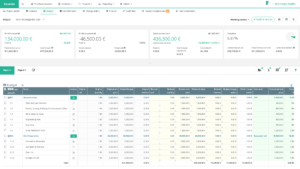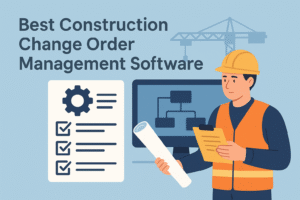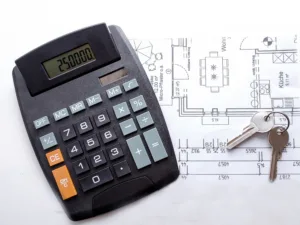In the construction industry, effective cost control can often decide between turning a profit and suffering a loss. This guide aims to demystify cost control and offer strategies to refine your approach.
The challenge of keeping construction projects within budget is well-documented, with a staggering 75% of projects overshooting their budget by a significant margin. A recent study highlighted that only a quarter of construction projects managed to stay within 10% of their initial budget over the last three years. These statistics are a wake-up call for construction managers striving for financial discipline.
Achieving budgetary goals in construction may seem daunting, but it is not unattainable. Implementing a few strategic adjustments to your cost control practices can significantly enhance your chances of joining the 25% of projects that manage to stick close to their budgets.
Cost control is an integral component of construction management. Without it, project management becomes a balancing act of unpredictability. Understanding the essence of project cost control and applying effective strategies in your construction firm is crucial for steering your projects away from financial turmoil and toward successful completion.
Table of Contents
What is cost control in construction?
Cost control in construction means making sure that the money spent on building things doesn’t go over the planned budget. This involves monitoring how much is spent on workers, materials, and other costs to ensure the project doesn’t end up costing more than expected.
To do this well, you need to start with a good plan of how much everything will cost and then keep checking the spending throughout the project. If there’s no cost control, the project could end up spending too much money, leaving the company that’s building it with very little profit or even losing money. So, for a construction company to do well, being good at cost control is very important.
10 methods for construction cost control
Mastering cost controlling in the construction industry is a challenging task, and it’s okay if you haven’t got it all figured out yet. Not many do. It’s a complex skill that takes time and experience to develop. However, the good news is that you can take several concrete steps to improve your cost management practices. Even if you’re not perfect at it, implementing proven cost control techniques can significantly impact your next project. Below, we’ll explore ten effective cost-control methods to help you see immediate results and enhance your project’s financial performance.
1. Make precise budget estimates
Accurate and detailed cost estimation is essential for any construction project to stay within budget. This involves thoroughly analyzing every potential expense, from labor and materials to equipment, additional unforeseen costs, and permits. Rushing through cost reports during this critical phase or being overly optimistic without solid justification can lead to significant financial issues down the line.
Drawing on historical data and past project expenditures is invaluable in creating realistic and precise budget forecasts. This historical insight helps anticipate the likely costs and set a budget that reflects the project’s true scope.
Moreover, involving your team in the budgeting process can enhance the accuracy of your estimates. Team members may identify potential oversights or offer insights that can prevent costly errors. Collaborative budget planning not only ensures a more reliable financial forecast but also promotes a collective responsibility toward better cost control and management.
A quick tip: Leverage your team’s experience and past project data for comprehensive market research and detailed cost estimate and analysis. This collaborative approach to budget planning and cost estimation lays a solid foundation for effective financial management throughout the project lifecycle.
2. Create an accurate project schedule
A well-thought-out project schedule is crucial for the efficient use of resources, helping to control costs, reduce unnecessary downtime and avoid the extra costs associated with overtime. By carefully planning the timeline, you ensure that materials arrive when needed, labor is deployed efficiently, and equipment is used effectively, all of which are vital for keeping the project on track and within budget.
Utilizing advanced scheduling tools can significantly enhance this process. These tools offer the advantage of real-time updates, making it easier to identify and resolve scheduling conflicts or delays as they arise. This level of flexibility and oversight allows construction managers to make swift adjustments, thereby preventing delays that can lead to cost overruns.
In essence, effective project scheduling is about more than just keeping to a timeline; it’s about maximizing productivity and resource utilization to ensure the project progresses as efficiently as possible, avoiding unnecessary expenses.
3. Improve team communication
Effective communication within your team is crucial for managing your project’s budget effectively. When each team member is clear about their responsibilities, deadlines, and the resources at their disposal, the project is more likely to stay on track financially. Clear instructions and expectations can prevent misunderstandings and costly errors.
Open communication channels also enable the team to address and resolve financial challenges as they arise, allowing for immediate problem-solving. Implementing a unified messaging application for all team members ensures everyone receives the same information and updates, promoting consistency and clarity across the project.
A quick tip: Assign specific communication duties within your team to maintain a steady flow of information. For instance, you can require team members to submit a daily progress report to their supervisor at a designated time each day. This practice of regular reporting keeps you well-informed about the project’s progress and provides insight into potential cost issues before they escalate.
4. Implement smart procurement strategies
Effective procurement strategies are a cornerstone of cost-efficient project management. It’s not just about chasing the lowest price tags; accurate strategic procurement focuses on securing contracts that offer the best value for money. Techniques such as bulk purchasing, fostering long-term relationships with suppliers, and leveraging competitive bidding processes can lead to significant savings.
Moreover, it is crucial for project manager to choose suppliers and subcontractors known for their reliability and quality. These partnerships can minimize the risk of project delays and issues related to poor workmanship or materials, which can unexpectedly inflate costs. Construction managers can ensure smoother operations and better control over project budgets by prioritizing value and reliability in procurement decisions.
5. Create daily reports and regular updates
Maintaining open lines of communication is vital in construction management, but the practice of gathering daily updates from your team is equally important. These regular reports about the day-to-day happenings on the construction job site enable you to make necessary adjustments to your plans in real time.
Receiving detailed updates allows you to monitor if the project costs are creeping up unexpectedly or if there are potential delays on the horizon. Addressing these issues promptly can prevent minor problems from escalating into major setbacks. Consistently staying informed about the progress of your project minimizes the risk of being surprised by budget overruns as the project nears completion.
A quick tip: Insist on detail-rich updates. While a broad overview of daily activities is useful, specifics such as the tasks completed, equipment and materials used, and labor hours expended offer a clearer picture of your project’s status. This level of detail supports better decision-making and effective project management.
6. Create backup plans
A contingency plan, or Plan B, is crucial in construction projects to safeguard against unforeseen issues that could inflate your budget. Situations like equipment failure or a subcontractor backing out at the last minute are not uncommon and can derail your project timeline and finances.
As part of your project strategy, it’s important to anticipate potential problems. Consider what could disrupt your project flow, such as the equipment and subcontractor examples, and devise a clear strategy for addressing these issues without incurring additional costs. This might mean having backup equipment like an extra backhoe on standby or a list of reliable subcontractors you can call upon should your primary choice become unavailable.
A quick tip: Engage your team in the planning process. Their hands-on experience might highlight risks you hadn’t considered. Incorporating their insights into your backup plans prepares you better for potential hurdles and unexpected costs and fosters a collaborative team environment.
7. Find reliable subcontractors
Subcontractors play a crucial role in the smooth execution of construction projects, but they can also be a source of delays and additional costs if not managed correctly. This is often due to their external status to your core team, leading to availability issues, variable work quality, or misunderstandings.
To mitigate these risks, it’s wise to cultivate a roster of reliable subcontractors. These should be teams or individuals you’ve successfully collaborated with who understand your expectations and consistently deliver good work. Having such a list means you won’t be left in a lurch trying to find a replacement mid-project.
A quick tip: Make it a practice to assess the performance of subcontractors after each project concludes. Note down their punctuality, work quality, and overall reliability. Keeping track of these evaluations helps you make informed decisions for future projects, ensuring you work with the best possible team each time.
8. Manage change orders effectively
Change orders are a common aspect of construction projects, and while they can’t always be avoided, their impact on costs can be effectively managed. Establishing a straightforward procedure for how changes are reviewed, approved, and documented is crucial. This ensures that any adjustments are made with a complete understanding of their implications on the budget and the project timeline. Clear and open communication with clients and subcontractors is crucial to ensure everyone is on the same page regarding these changes and their effects.
Minimizing unnecessary change orders is also essential to managing construction costs. Often, clients’ requests for changes can lead to increased costs. You can significantly safeguard your budget by setting your contract to allow changes only in cases of emergencies or your own errors. This approach helps manage the current project’s costs and reduce expenses in future projects.
A quick tip: A well-thought-out and detailed project plan shared with your client can prevent many unexpected changes later. Ensuring that you and your client have a mutual understanding of the project scope and details from the beginning can go a long way in minimizing the need for change orders.
9. Conduct a post-project review
After you’ve completed a project, reviewing your cost management is crucial, regardless of whether you managed to stay within the budget. Gather the key team members and stakeholders for a thorough discussion. Compare your initial budget projections with the actual costs and expenses incurred. This is the time to reflect on the strategies that worked, identify the ones that didn’t, and brainstorm ways to enhance performance for future projects.
A quick tip: Pay attention to the details. Generate various reports to analyze the project from different angles. Look into specific areas such as adjustments made during the project, equipment usage, and the total hours your team put in. By examining every facet of your project in detail, you’re likely to uncover insightful lessons that will aid in improving future endeavors.
10. Use construction management software
Construction management software is a game-changer for overseeing project elements like budgeting, scheduling, and procurement all in one place. It gives you a clear, real-time view of your project’s financial health, which is crucial for making wise decisions and controlling costs. Being able to check on your project’s progress and finances anytime means you can make quick changes to your plan whenever necessary.
Relying on essential tools like spreadsheets for cost control might work for tiny projects, but for anything more significant, you’ll need the advanced capabilities of construction cost management software. This technology not only tracks your construction budget but also helps create daily reports, plan and schedule, improve workflow, organize bids, and much more, making it an indispensable tool for construction managers.
A quick tip: Don’t rush into choosing software. Test out several options to see which best fits your business needs. A platform might have great reviews, but that doesn’t guarantee it’s the right choice for your situation.
Conclusion
Many construction projects go over budget because of poor cost-control practices that lead to cost overruns. To manage construction projects effectively, you need to use a cost-control process that is well thought out. Cost control in construction is quite difficult because there are so many moving parts during construction projects. Project managers must track construction costs, create accurate cost control plans, conduct cost estimates, and find cost savings opportunities.
I recommend using Bauwise construction cost management software for general contractors to prevent cost overruns, improve cost control process, reduce construction project costs, and improve your construction business’s financial health.
About the Author

Taavi Kaiv
Taavi Kaiv is a construction specialist with over ten years of experience in the construction industry. Taavi is an accomplished construction project manager with many successful projects that have been completed under his guidance. Taavi holds a master’s degree in construction management from the Tallinn University of Technology. View profile
Related posts
Read our articles where you can find useful and relevant information about construction cost control:






